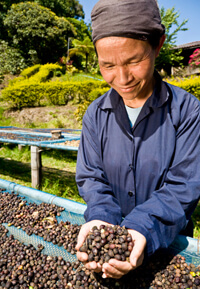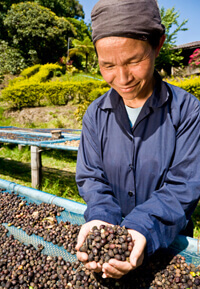
My family and I watched a documentary called Food Inc. on Thanksgiving. I’d figured, I better capitalize on the opportunity while everyone was in food coma and couldn’t protest. I also reasoned (and yes, there was some pleading involved) that since I fed them, I should get to choose a family movie. Good negotiations tactic, right?
Let me just say that, despite a few moments of dozing heads here and there, they stayed awake long enough to understand the main message; for all the wrong ways that our foods are produced, there are just as many ways we can control what we eat – buy organic and from small independent farmers. And until we saw the movie, it was a concept that we were familiar with and tried to remember whenever we go to the grocery store but were not so clear as to reasons why. Food Inc. convinced us how supporting small farmers was not only ethical but also healthy for us since farmers produce foods with utmost care and respect, unlike big food corporations.
So when a marketing representative from Mambo Sprouts recently contacted me to review the Fair Trade Mixer Basket from Equal Exchange, I couldn’t stop smiling at how serendipitous it was. But before I tell you about their products, I want to tell you a little bit about what Fair Trade is all about.
Did you know?
- Every coffee bean, cocoa bean and tea leaves are picked by hand?
- An average coffee picker in Guatemala has to meet a quota of 100 lbs. of coffee beans to make less than a price of a Tall Caramel Macchiato from Starbucks per day?
- Most coffee pickers are migrant workers who live in temporary housings with no labor rights or laws protecting them?
- Many pickers have to enlist their children, as young as 6 to 8 years old, to barely survive, exposing them to dangerous work environments and no child labor law to protect them?
Source: globalexchange.org
What is Fair Trade?
According to Wikipedia, fair trade is “an organized social movement and market-based approach that aims to help producers in developing countries and promote sustainability. The movement advocates the payment of a higher price to producers as well as social and environmental standards.”
But more than that, according to fairtrade.net, “the producers are involved in decisions that affect their future. Fairtrade certified producers jointly own and manage Fairtrade Labeling Organization (FLO). Through the FLO’s Board, its Committees and consultation processes producers can influence prices, premiums, standards and overall strategy.” And in doing so, Fair Trade empowers farmers and workers thereby making them to feel responsible to produce foods that are clean, competitive in prices, and are healthy for consumption. Most of the farmers are marginalized producers who need the support of the Fair Trade in order to move towards economic self-sufficiency and stability.
How does buying Fair Trade benefit me?
Shoppers can buy products in line with their values and principles. They can choose from an ever-growing range of great products including coffee, tea, cocoa, sugar, nuts, berries, and bananas. By buying into Fair Trade, consumers support producers who are struggling to improve their lives, living conditions, and working environment and as result, they take pride in their work, producing better quality products. Furthermore, most of the Fair Trade products are organic or minimally or naturally processed foods, which means better health for consumers.
How does Fair Trade help the environment?
Fair Trade rewards and encourages farming and production practices that are environmentally sustainable. Producers are also encouraged to strive toward organic certification. Producers must:
- Protect the environment in which they work and live. This includes areas of natural water, virgin forest and other important land areas and dealing with problems of erosion and waste management.
- Develop, implement and monitor an operations plan on their farming and techniques. This needs to reflect a balance between protecting the environment and good business results.
- Follow national and international standards for the handling of chemicals. There is a list of chemicals that they must not use.
- Not, intentionally, use products that include genetically modified organisms (GMO).
- Work out and monitor what affect their activities are having on the environment. Then they must make a plan of how they can lessen the impacts and keep checking that this plan is carried out.
Source: fairtrade.net
According to Fairtrade website, there are numerous standards that the products have to meet in order to be certified. The standards are too detailed for me to go into here but read here to get more information on its process. I was glad that there are these standards in place so that not just any ‘Joe Farmer’ can slap on a Fair Trade Certified sticker on his products.
While Food Inc. showed various farming industry being controlled by just a few huge conglomerates, it turns out coffee industry is no different. Coffee is an extremely powerful commodity; the world’s most heavily traded product, behind petroleum, and the largest food import of the United States. The big three companies (Kraft, which owns Maxwell House and Sanka, owned by Philip Morris; Procter & Gamble, which owns Folgers and Millstone; and Nestle.) maintain over 60% of total green bean volume. But most of the coffee they carry are not Fair Trade Certified but organizations like Globalexchange.org has tirelessly worked to have Fair Trade Certified labeled coffee in stores like Starbucks (in 2000), the largest coffee retailer, and to have Proctor and Gamble (in 2003), the largest seller of coffee in the United States, to carry Fair Trade Certified coffee.
Source: globalexchange.org
So, having researched a bit about Fair Trade and whether paying slightly higher price is worth the cause, I can honestly say, with a resounding “YES!”, it makes a whole heck a lot of difference. Eating or drinking foods that farmers took such pride in making, and to be able for them to sustain their livelihood while taking care of the earth, makes so much ethical sense. The only way we can make a difference is to demand Fair Trade Certified products from companies and be willing to pay the premium prices for their product quality and the lifestyle quality of the farmers producing these goods.
Now that I’ve convinced you to buy Fair Trade Certified foods, preferably organic, I will review some products from Equal Exchange tomorrow and host a fantastic giveaway.
♥Karen Lee
ecokaren.com

